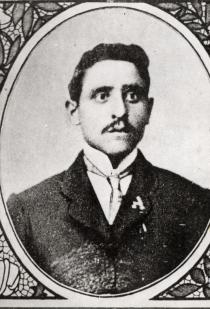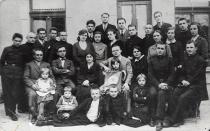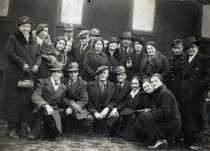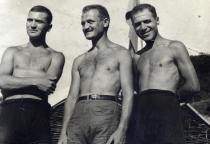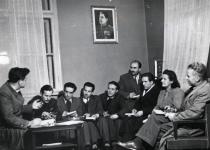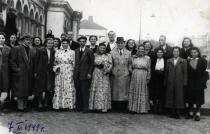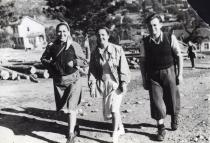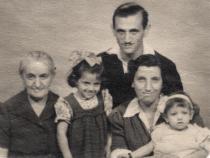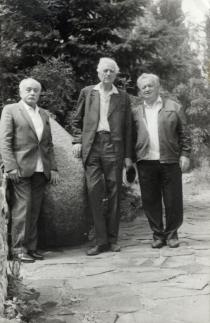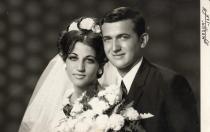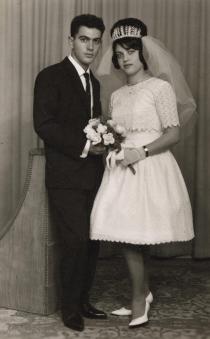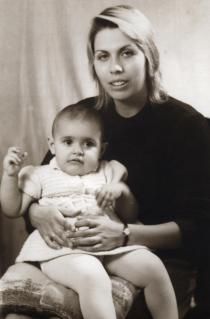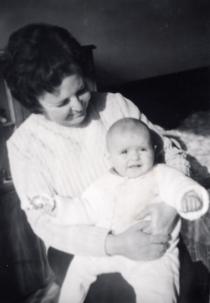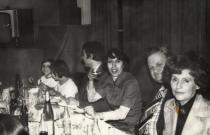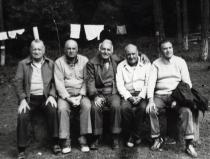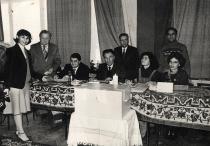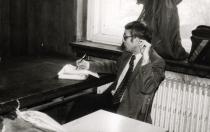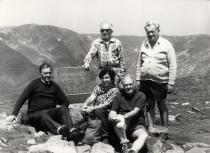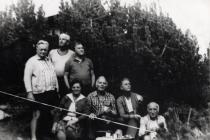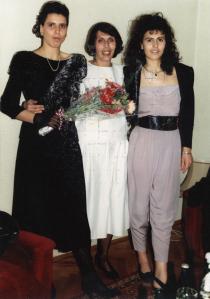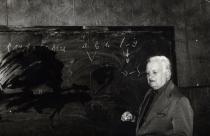
Isak Avram Levi
Sofia
Bulgaria
Interviewer: Dimitar Bojilov
Date of interview: September 2004
Isak Levi is a tall and big man with an impressive sense of humor. Despite the fact that he is advanced in age, he strictly observes the traditions; he also visits every day the ‘Bet Am’ Jewish community center to have lunch with his friends. Punctuality and correctness are qualities of extreme importance to him. As he claims, it is out of question for him to enter into an engagement and not to fulfill it. In the last several years he has devoted himself to mapping the houses inhabited by Jewish families in Sofia in the first half of the 20th century. Isak Levi is a member of the Board of the Sofia Synagogue, as well as of the Bnai Brith Jewish organization.
It is known from history that 380,000 Jews were expelled by Ferdinand and Isabela during the 15th century. [Editors note: It is hard to estimate the number of Sephardim expelled from Spain and Portugal; according to the Encyclopedia Judaica a number of 250,000 subsequently settled in Ottoman territory, North-West Africa, Italy and Western Europe.] They left via the Mediterranean, some of them landing on the Italian coast, but they were not welcome there and thus they moved to the Balkans. [cf. Expulsion of the Jews from Spain] 1.
At that time the Balkans were subject to a lot of changes – for more than a hundred years Bulgaria had already been enslaved by the Turks. The Jews landed on the scattered islands [along the coastal line] and were accepted by the Turks. At the beginning the Jews settled in the cities of Salonika and Adrianople [today Edirne, Turkey].
Except for the language, we, Sephardic Jews 2 differ from Ashkenazi Jews in terms of some cultural characteristics. Our art, our customs and our ‘character’ are more lyrical, while the Ashkenazi Jews are more resolute; I would call them more ‘emerald.’ We have kept the soft vowels in our pronunciation – ‘e’ and ‘i’ – which are predominant in our manner of speech, on the account of the hard ones – ‘o’ and ‘a.’
Ten years ago I was in Dublin, the capital of Ireland, where the Jews are Ashkenazim and I visited the synagogue there. I met the people there and I wished to recite the Kaddish, which is repeated ten times during the service. So I asked to be allowed to recite the last Kaddish, which is usually given to foreign guests. I recited it and everyone was astonished as I did it the way I had learned it – with the soft vowels.
However, the difference between our old Spanish language, Ladino 3, and contemporary Spanish is not that great, therefore we can easily understand contemporary Spanish.
My family background
My father’s kin is from Salonika. As far as my father has told me, there were many rabbis, religious figures, as well as artists. [Having an absolute Jewish majority, Salonika was the ‘capital’ of the Balkan Sephardim up until the Holocaust.] Yet, they didn’t have many opportunities there to advance and my grandfather together with his brothers and their families decided to move to the north. [Both Salonika and Gorna Dzhumaya were Ottoman territories up until the First Balkan War (1912). The borders separating the two cities were drawn after the Second Balkan War (1913) when Macedonia was divided up in between Greece, Serbia and Bulgaria.]
Besides, Spain is a ‘high,’ mountainous country – the average height of its plateaus is about 2000 meters. Moreover, the climate there is very severe. After being chased from Spain, the Sephardic Jews arrived in Greece [The Ottoman Empire] by sea and settled in the southern part of the [Balkan] peninsula. Many of them couldn’t get used to the climate, and then they learned from travelers that there was a place to the north with four seasons, just like in Spain.
In Greece, especially in the south there are only two seasons – summer and winter. The winter is very humid and unpleasant, while the summer is unbearably hot, therefore many of the families moved to the middle part of the Balkan Peninsula – Bulgaria, in the region of Dupnitsa and Gorna Dzhumaya. The winter is nice here and the weather is comparatively cool here.
[Editors’ note: The reason for migrating from the Aegean littoral to the Balkan inlands was probably for economic rather than climatic reasons. Sephardim being typically engaged in textile production in Salonika and textile trade to Central Europe settled in cities en route towards the Danube, connecting South-Eastern and Central Europe. Gorna Dzhumaya and Dupnitsa are located in strategic positions in the valley of the Struma River, on the way from Salonika to Sofia, and further to the Danube.]
And so, my paternal ancestors moved to Dupnitsa. Most of my father’s uncles and aunts were tailors and shoemakers. All of them were ‘Judaikos,’ that is, people who professed Judaism. This means that the perfect Jew should observe 613 bans, that is, things which are forbidden, and respectively there are 613 rights, that is, things which he is allowed to do. [Editors’ note: According to the Rabbinic tradition the full number of mitzvot (commandments, including both prohibitions and precepts) is 613, that is, taryag mitzvot.]
My father’s grandfather was a rabbi, but his children did not keep this tradition and oriented themselves toward crafts – shoemaking and tailoring, while my grandfather was involved in the goldsmith’s trade as well.
My father devoted himself both to trade and tailoring. He started dealing with trade, yet simultaneously he led a strict religious life. At that time it was a rule for every Jew to visit the synagogue three times a day for a prayer – in the morning, in the afternoon and in the evening. It was observed by everybody and that is how my father got started.
My father, Avram-Nissim Levi, was born in Dupnitsa in 1865. He graduated from a school with extensive studies of the French language. And if I know a little French, I owe it to him, as he was my first teacher.
He and his two brothers used to live for some time in Dupnitsa and after that they moved to Gorna Dzhumaya. He got married there, but his wife didn’t bear him any children. He was one of the prosperous traders in Gorna Dzhumaya. He used to sell manufactured goods to people from the neighboring villages, as well as medicines known at that time, without actually being a pharmacist. People knew and trusted him.
It is interesting that in the period while he was living in Gorna Dzhumaya, he learned Turkish very well. [Gorna Dzhumaya was a part of ‘European Turkey’ until 1912.] Even much later, when we moved to Vratsa people realized that he knew Turkish and in the café, where they used to gather, they made him talk in Turkish to them. My father used to buy bread from a baker who was a Turk, and my father loved chatting in Turkish with him. They were very pleased with that, as though he was their teacher in Turkish. He only spoke it though, he couldn’t write a single letter.
[Editor’s note: The Latin script in Turkish, that made writing easy, was only introduced in the Turkish Republic after WWI. Before that the Arabic letters were used that made the writing in Turkish difficult and as a matter of fact relatively few people could master it.]
Until 1912, the First Balkan War 4, the town of Gorna Dzhumaya was held by the Turks. This war was considered a liberation war by the Bulgarians, as Bulgaria fought for its territories. Then the Turks were chased from the town of Gorna Dzhumaya but before leaving it, they burned it down.
The house where my father used to live was also burned to the ground. Then he raked up the ashes and found there a gold medallion with a diamond. From the strong fire and the high temperature the gold had melted into leaves but the diamond was preserved.
In accordance with the custom my father fixed a stake into the ground where he had found the diamond and from that place of one square meter he took the soil, which was considered to be the ashes of his wife, who burned to death during that fire, and thus he buried her. That diamond was a gift to her from him.
My father was 48 years old at the time. He decided to look for a new wife and therefore he came to Sofia. Before that he gave his shop to his assistant.
My mother, Rashel Levi, was born in Sofia. Her father is from the Behar kin. The Behars belong to the Jews who had lived here as early as Roman times. According to the legend the Jews who left to Europe in Roman times left posts of theirs at every one hundred kilometers; around these posts people started settling and thus towns were formed. In Bulgaria there was such a post around Ruse and Jews settled there.
The Behar kin was Sarah’s kin, the wife of Tsar Ivan Alexander [a Bulgarian tsar from the beginning of the 14th century], who gave birth to Tsar Ivan Shishman [the last Bulgarian tsar before the medieval Bulgarian state fell under the Ottomans in 1392]. I know this from my mother’s stories. Her father belonged to that kin, while her mother was from the Sephardic Jews.
My maternal grandfather was called Isak Behar, and I was named after him. Yet, my mother and her brother, who was two years older than her, were orphaned at an early age and were raised by their aunt as her own children. She herself had seven daughters and two sons.
My mother had attended school, she knew how to read and write. When she grew up, a young guy, a sandal maker from a good family saw her and wished to marry her, and she agreed. He was a Jew from Dupnitsa, who had come to Sofia and there he noticed her and proposed marriage to her. She accepted and married him, and thus she went to live in Dupnitsa at his father’s place.
Her husband was from the Pilosof kin. They lived together from 1910 to 1911 but in 1912 the war started [First Balkan War]. He went to fight in the war, and she was already pregnant. He left for the front line and never came back. Meanwhile she gave birth to a girl, my sister Oro.
Unfortunately, as it often happens in such cases the boy’s parents wanted to get rid of her. She wrote a letter to her brother and he took her back to Sofia together with the baby.
My father, Avram-Nissim Levi, learned about her when he went to Sofia and he proposed marriage to her. At first she didn’t agree but her brother’s wife – as he was already married and she used to live at their place – told her, probably because she wanted to get rid of her, ‘Well, he is the right man for you and you should take this chance!’
And so she accepted despite the great age difference: she was 23 to24 years old, while my father was 48; she could have been his daughter. And she got married to my father and they settled in Gorna Dzhumaya. I was born after nine months, in 1914, on 6th December during the Chanukkah holiday. I am my father’s firstborn child and my mother’s second one.
After that my mother gave birth every two years. Two years after I was born, in 1917, she gave birth to my brother David; after that, in 1919, my brother Mordechai was born; in 1921 my sister Adela was born; in 1923 my mother had a miscarriage, and in 1925 she gave birth to my youngest brother, Yosif. Our age difference was ten years.
Growing up
We had a hard, yet interesting life. We created such incredible relations and we have so many memories, a life-time unforgettable. I remember us, five kids playing in the yard and suddenly having an itch, and all of us scratching ourselves. A neighbor came then and told my mother to smear us with sulphur vaseline. And then we got undressed – the boys and the girls in separate rooms… How can you ever forget such a thing!
In the course of time, I, being the eldest among them, gradually turned into something like a ‘third’ parent for them, as my father was already 60 years old when my youngest brother Yosif was born.
Our mother tongue was Ladino. My mother initially talked to me in Ladino. When I turned two, my father started taking care of me and he began talking in Ivrit to me. At the age of five, I was already able to write from right to left and read fairy tales in Ivrit. Then I began to get ready for school. I studied both Bulgarian and Ivrit at the Jewish school.
Later, when I went to the Bulgarian school it was a little difficult for me there as I didn’t have the basis for the Bulgarian language that I used to have in my earliest years with Ivrit. We used to speak only in Ladino at home. Even for my father it was sometimes hard to talk in Bulgarian. My mother spoke Bulgarian better, yet it was difficult for her also.
In Gorna Dzhumaya we lived in comparatively good conditions. My father had fixed the house, which had once burned and we used to live in it. It had four rooms. We lived separately in it. We kept very friendly relations and always got on very well with the Bulgarians in the town.
I was born in 1914, and in 1915 the war started [cf. Bulgaria in World War I] 5, which lasted until 1918, and I remember that we lived on the ground floor of the house, while some officers used to live upstairs. We had a fountain inside the house linked to the town’s water-main.
For a certain period of time maids from the [neighboring] villages used to help my mother with the housework. They were treated in a very good manner. My father even used to help them a lot, especially with their weddings when they got married.
I used to study in Gorna Dzhumaya till the fourth grade, the first and second class at the Bulgarian junior high school, and then we moved to Vratsa.
In the 1920s my father’s business started declining because after 1918 the country’s territory was re-allotted. Bulgaria lost lots of territories, which were annexed to the territories of Yugoslavia and Greece. The clientele withdrew and my father decided to change his subsistence.
Therefore he decided that we move to Vratsa where he applied to become a rabbi. At that time my mother was pregnant with Yosif – that happened in September 1925. Local people there had to find a home for us. They found us lodging in a basement, and in this basement Yosif was born.
In a year we moved to some sheds where there used to be a church beforehand. And there we lived – all in all, we spent eight years in Vratsa. There I studied in the high school, like all my brothers did. Yosif studied only in the first grade.
Generally there weren’t any anti-Semitic movements at that time. Only two times synagogues were burned – in 1910 in Vratsa and in 1903 in Lom. It was done in most of the cases by strangers [people from other villages], who were later isolated by the local people and chased away in the end.
I was the only Jew in Vratsa’s high school and I had many good friends among the Bulgarians. Yet, there were several anti-Semites, who had come from other towns and they assaulted me, beat me and bothered me. The whole town used to gather in the central square and those anti-Semites used to threaten me there also, yet my friends shielded me from both sides and even walked me home.
In Vratsa my father began to perform all rituals during the holidays. Actually, my father never cut his hair, never shaved and always had a little beard, just like his brothers as well as his friends. My father visited the synagogue so regularly that he also attended courses for slaughtering in order to be a shochet, too. In Vratsa my father was very good at his job. He made friends with all Christian priests, too.
My father used to check the knife’s sharpness by passing a nail over its edge, no roughness had to be felt. Usually the knife’s edge for birds was around a span long, while for bigger animals it was longer.
In Vratsa I used to help my father by preparing the stamp put on the animal in order to mark it as being kosher. I used to take a rubber and hollow a few millimeters out in it with a little knife, so that the three letters in Ivrit, which mean ‘kosher’ [kaf, shin and resh], would stay protruding. The letters had to be written backwards in order to be printed correctly. This rubber is dipped in an ink-soaked inkpad. When the Jews came to the slaughtering house, they wanted to see if the meat had such a stamp and only then they bought it.
After the basement we set ourselves up in rooms. We lived in a room and a kitchen. My father and my mother inhabited the room. At that time she was breast-feeding Yosko. My two younger brothers used to sleep in the same room when they were little boys. I, and later my brother Yosif as well, used to live on a wooden bed in the kitchen, where we used to light a fire at first with wood and later with coal. It was cold there, there was no heating, yet we covered ourselves and got warmer. My sisters used to spread out on the floor and there they slept.
We were a family of eight people, occupying a very narrow space and we were a very united family. There was neither crying nor quarreling between us. There was never enough food, as we were many children. It was difficult for our parents to raise us, yet we grew up with a lot of joy also.
We lived on the outskirts of Vratsa, just where the town’s territory began. The climate there is wonderful and the place is known for its hard Balkan water [i.e. mountain water from the Balkan Mountain], very harmful for the health. Yet people have lived for many years there.
We had a lot of stones in the yard and when we were old enough we gathered, moved away all the stones and planted vegetables there. Thus my mother became a tiller for the first time. We also had a hencoop at home and the cocks used to wake us up every morning. You should never leave one hen per cock; they should be at least four hens because if it is only one, he might kill her.
At the age of 18 I was involved in some kind of conspiracy. A strike was organized by the northwestern schools in Bulgaria. Its leader was Zhivko Trapkov Oshavkov, who was the first teacher of social sciences in Bulgaria. For example, Zhelyo Zhelev [former Bulgarian president, 1990-1998] and Petko Simeonov [Bulgarian writer, journalist and politician] are students of his. The strike was directed at improving the conditions at school.
Oshavkov made a big mistake as he invited also representatives from Pernik, Vidin and Lom. All school representatives came and we gathered in the water-mill of Vratsa. The representative from Pleven said that he had to leave the meeting earlier because his mother was sick. So he left the meeting and in half an hour the police came. It turned out that he was an agent and had betrayed us.
We were moved to Sofia together with him, we were arrested and investigated. We were interrogated by Nikola Geshev. He was a former communist, who later turned on them and knew all their secrets as a result of which many people became his victims. He was a very clever and talented cop. When he saw that I was only 18 years old, very young and with no connections, he released me under the condition to let him know in case of future activities of that kind. He wanted us to become his agents but it didn’t happen.
I studied in Vratsa until the seventh grade, but seeing how difficult it was for my father to provide for our large family, I realized that I wouldn’t have the opportunity to continue my education. I envied the students who went to Sofia in order to study. When I understood that my parents wouldn’t be able to provide for me to continue with my studies, I quit high school in the seventh grade, and the last high school grade is the eighth one.
I left and enrolled in the local two-year textile school in Vratsa. I attended it for one year and simultaneously I studied as a private student and took the exams for the seventh high school grade also.
While we still lived in Vratsa, I used to go to Sofia as I had practice in the textile factories. Together with that I prepared well and took the second-year exams at the textile school and in 1932, at the age of 18, I went to Sliven and later to Sofia in order to work as a textile worker.
It was a good job, a well-paid job and I took care of the whole family. When they worked, my brothers got a salary of 1000 leva, which was a very low salary at that time. Being a textile worker I got 6000 leva. Yet, I had a large family to provide for, and, to give you but one example, my friends were able to order suits for themselves at the age of 18, while I couldn’t afford it until my 25th birthday.
However, I was pleased with my situation because I had fulfilled my duty and my siblings grew up thanks to me as well. I owe very much to my mother. She supported me in everything. She was a martyr, a saint, because it was she who built our decent family.
In Sofia I had very good masters. Actually, I was an absolute beginner in the job of a textile technician, as I took the degree very quickly and it happened so that I had to catch up with the others in the actual work process. I became an assistant to a very good master, whom we became friends with.
And so, in two years and a half, he and I were already colleagues in the ‘Ruse’ silk factory in the ‘Poduene’ quarter in Sofia. We split the sections and I managed very well. There were great machines in the factory, exported by Italy and Germany.
In 1933 we moved to Sofia. My father was already quite old then and hardly worked. First we settled in a shed. I remember we moved from one place to another six times or so. Most of the lodgings were on different floors, others were on the ground floor, yet we lived happily.
In 1936 my sister Oro got married and we had a wedding. As she was our half-sister, she was different from us. She was darker and not very good in school.
I learned the Jewish traditions from my father. When we were in Gorna Dzhumaya we visited the synagogue very often. That wasn’t the situation with Vratsa, where our visits got rare as there were less Jews there and the Jewish cultural life was not as rich as in the other towns. I have had greater opportunities for development in comparison with my brothers.
When we arrived in Sofia my brother Yosif was seven years old, and I gave him his first lessons in Ivrit. We enrolled him in the second grade of the Jewish school. Still, on the first school day he came back home crying and he wanted to go to a Bulgarian school. But in the end he graduated with a six [the highest mark in the Bulgarian educational system], while those who laughed failed at the exams.
My brother enrolled directly in the second grade, as he had finished the first grade at the Bulgarian school in Vratsa. In Sofia he had to catch up with the other pupils with the Bulgarian subjects and he had to start learning Ivrit from the very beginning, as the rest of the students already knew it. He put a lot of effort into studying and he succeeded. Now he is grateful to me for not moving him to another school, as that would have given his personality a totally different direction.
The two-floor building of the Jewish school in Iuchbunar 6 was on Bregalnitsa Street. Next to it, at the corner of Pozitano and Osogovo Street, the modern building of the Iuchbunar synagogue was built. The room, where the ritual slaughterer, the shochet, used to slaughter the birds brought by the Jews, was situated in a little shop at Osogovo Street.
The slaughtering ritual was very interesting. Before performing the ritual the shochet always read the prayer. It says: ‘Be careful, this cock (or this hen) will be slaughtered and his (or her) life will be passed to you and you will live your whole life in happiness.’
The shochet also slaughters herbivorous animals: sheep, calves, buffaloes. He takes his well-sharpened knife and his assistants, also slaughterers, hold the animal down. He bends over the animal and counts its cervical vertebrae, and he would cut it in such a way so that he would leave one more vertebra from the side of its head. He makes the section and marks the place where the animal should be slaughtered, and then he steps aside and leaves his assistants to finish the work. They have to slaughter it, skin it, hang it on the hooks and package it.
In the meantime the shochet carefully examines its internal organs and decides whether it is a healthy one and if it is good for eating. First he examines the epidermis, than the liver and after that the other internal organs. He assesses the situation with the animal according to the color of its organs as well. If there is even the slightest sign of damage in the tissues and the organs, that means that the animal was sick and thus not kosher and couldn’t be served as food to Jews.
According to the Torah it is absolutely forbidden to use blood for food. Therefore when slaughtering the animal, it should be totally blood-drained, then the meat should be brought home and lavishly salted as salt drains the entire blood. Then the housewife must wash it well and finally prepare it. Using blood is a great sin for the Jews.
We used to live right at the corner of Opalchenska and Positano Street. Our house was destroyed and a new one, a larger one, was erected in its place. We spent our whole life in lodgings, we never owned a house. We never had normal living conditions that others had, such as living-rooms, writing tables. All of us studied simultaneously and shared our common knowledge. The teachers, who came to our place to visit us, used to say how sorry they were that we had to live under such conditions.
I, my little sister Adela and my brothers David and Mordechai were born in Gorna Dzhumaya, while my sister Oro was born in Dupnitsa. My second brother got ill and could not further develop, while the other one, Mordechai, became a good printer in the state printing house. My sister Adela used to make glasses.
My youngest brother Yosif graduated from high school and then he graduated in law, became a lawyer, but meanwhile he was accepted in the police. In fact he retired as a police employee. At first he was an ordinary policeman. Yet, for a very short period of time he advanced in his career taking higher ranks, but I don’t know exactly what kind of a job he had.
The Jewish holidays are connected with history, earth and seasons. All celebrations were organized by the synagogue. On Pesach special bread is prepared only of flour [matzah], because the Jews had spent in the desert 40 years without having salt in order to salt their bread. They used to grind the flour manually and thus they prepared the bread they ate.
I think that Christianity was copied exactly from Judaism. I think that Christians believe in non-realistic things: for example, the Immaculate Conception and the Resurrection.
When we were better off materially, we had special dishes for Pesach. Every year we took them out especially for the celebration and then put them back in the cupboard. They were used in the course of eight days, as long as the festival took place. But when our financial opportunities deteriorated and we had to cut back, we used the ordinary dishes only.
During the War
I got married in 1942, during the Holocaust. When the internments 7 started in the 1940s my wife [Dora Levi, nee Avram Ronko] and I were interned first to Kyustendil, then to Pazardzhik and finally back to Kyustendil again. Before our internment we sold everything we had in Sofia almost for nothing. During the Holocaust we suffered a lot and in the material sense the Jews were deprived of and lost much. The restrictions were great and we had no financial resources.
In Kyustendil we were accommodated at our relatives’ place. Upon our arrival a cousin of my wife came to meet us. But we remained at their place only for a few days. We didn’t get on well, they made our life unbearable and we moved to a Bulgarian lodging. Out landlady’s name was Linka and she helped us a lot. At that time my father was ill.
During our internment to Pazardzhik, in order to provide for ourselves, we did some agricultural work. We dug gardens, planted cherry trees and gathered grapes. The wages were miserable, but we had no other choice.
At that time I realized that my wife had been arrested. So I went to Sofia in order to see what the situation was, we got married on the second day, and I returned immediately. I was punished, detained for 24 hours, but later they set me free. My service was from June to 5th December, until it started snowing.
My wife was arrested before 9th September [1944] 8 as a Jewish activist. There was a Jewish UYW 9 [i.e. only with Jewish members], which struggled against fascists. She was arrested because she collected money for the partisans. Nikola Geshev [a popular policeman and chief of a State Security department in the 1930s and the beginning of the 1940s at the time of the pro-Hitler regime in Bulgaria] interrogated her personally. He applied his own methods, yet it was already too late.
When he saw that she was a young girl, he tried to recruit her in order to get some more information about the others through her. Yet, in 1943-1944 the political situation had already changed, the Soviet troops began their attacks, so did the USA and England. Therefore Geshev’s methods – although he was a very bright cop – were not as effective as before.
In Pazardzhik there was only one textile enterprise, in which clothes were being made out of jute and sacks were being sewed. Some good people recommended me to the owners and thus I started working. My wife also joined me there as a weaver, and so did twelve more Jews, who were interned like us. They were very grateful to me for that.
So the winter of 1943 finally came to its end. During the next spring I received an instruction to go to a forced labor camp 10. All young men were mobilized. We were sent to the village of Gabrovenitsa, 10 kilometers away from Pazardzhik. We were accommodated in sheds and we started digging.
Yet, the chief engineers from the textile factory decided that they needed me. After I had been in the camp for two days one of the factory’s owners, Sotirov was his name, together with the local colonel went to the camp’s superior and asked him to release me. He agreed and thus I got back to work.
The other Jews were both happy about me and envied me. I was released from the forced labor camp because the order said that if there were more than three brothers in a [Jewish] family, one of them had to be liberated [from the forced labor camp].
At that time my wife got ill. I sent her to her parents, who were interned to Kyustendil and in a few months I joined them. I did mostly agricultural work there. We helped local people to cultivate the earth and gather the crops. I am a technician and whenever it was necessary to maintain a machine, I was asked to fix the problem. Our relations with the Bulgarians were very good but the payment was very low.
After the War
And so, 9th September came as well as the end of the war. We returned to Sofia and found out that other people had already settled at our place. We started searching for another lodging. We settled temporarily at the place of some relatives of ours, who had a three-story house in Iuchbunar, on Straldzha and Paris Streets, which has already been destroyed and no longer exists. They gave us two rooms – one for my wife and me, and the other one – for her parents.
I got back to my old job in the silk textile factory upon my return to Sofia. There I worked in shifts until May 1945. Thus my work as a technician ended after 15 years.
During the same year I enrolled in the party school 11, which prepared its organizational cadres. I attended the school for seven months and finally I took the exams. In 1946 I graduated from the school and started working for the [communist] party. At that time the preparation for nationalization was set forth. I was involved in the preparation process and was appointed director of a big enterprise in my capacity.
In the course of three years I was director of a large textile enterprise. Yet, a problem occurred, as a result of which I was fired. In the process of textile production there are strictly specific requirements. Water steam at fixed temperature is being used in order to dye the textile. There was a problem with this steam. So, in order to be economical, the enterprise started using steam at a lower temperature. Thus the coals used for preparation of the steam were economized.
However, I did not agree and protested against it, I even ordered on my own responsibility the steam temperature to be increased for the colors to be fixed better in the textile. Yet, this was considered by the higher circles of the Bulgarian Communist Party 12 to contradict the party’s policy and I was fired as a factory director, as well as expelled from the BCP.
In these times I was impressed by the fact that very often people with no professional experience and qualification were hired for leading positions in the production. They were former partisans and active anti-fascists. For example, in our enterprise a nice young girl was employed, who used to be a partisan for some years, she was awarded several times and was declared a hero. Therefore no one cared whether she was good at her work or not. This is only one example of the tendency that existed back then.
The case with the steam and me being fired illustrated the same idea. Some incompetent superior party official had decided just like that, that the textiles could be dyed with less steam and had ordered the coal deliveries to be lessened. My disapproval was interpreted as disapproval of the party’s policy. I was even subject to a trial for letting the steam out, but finally I was acquitted. In a year I was rehabilitated, my membership in the party was reinstated and I was offered a new job as a consultant.
There were textile enterprises in the light industry and I became instructor there. In the co-operatives there were textile enterprises, where I worked not as a chief but as an employee. Those were a kind of workshops, small factories. I have been a member of the party for nearly 60 years and I am still a member.
Later I was invited to join the Technical Progress Committee as a textile specialist. We were sent as a delegation abroad in order to buy textiles. Thus I have visited Norway, France several times, Germany, I have also been to Russia several times, and then came the time for me to retire. After my retirement I collaborated with many enterprises.
As far as the attitude of Bulgarians to Jews is concerned, I can say nothing but the best. Because when there was anti-Semitism worldwide, when there were murders everywhere, there weren’t such things in Bulgaria. Bulgarians and Jews have been living for more than 400 years in an atmosphere of mutual understanding.
There were two great events in the 20th century. The first one is that 100 million people were killed, this was the most war-loving century. And at the same time there was a small nation, which saved 50,000 Jews. It’s a small thing, yet it’s a great thing.
You feel free as long as you have good friends. Even though they were fewer, there were Bulgarians, with whom we got on very well. Every year in the course of ten years we went on excursions – from 1981 to 1990, even during the new regime [the period after 1989].
Within these 45 years after 1944 we became less ‘Jewish’ because of the Party’s attitude. Some very refined restrictions were introduced and the Jewish schools were closed. I was raised as a Jew up to my 25th year of age. The first language I spoke was Ladino and at the age of five I was already speaking Ivrit. Generally we became estranged with the holidays. I kept visiting the synagogue because that comes from my kin and I belong to my kin. But not everyone was like me.
My daughter Ema was born in 1952. She graduated from high school in Sofia, she got married early and she devoted herself to looking after her children. She was married twice and has three children. She has two girls from her first marriage, Teodora and Mariola.
The older one, Teodora, went to Switzerland in the 1990s and currently lives there. She is dealing with interior design. The other one got married in Sofia and has a very successful marriage. She is expecting a baby now.
My grandson’s name is Borislav, he is finishing high school and playing basketball in the Jewish organization’s team in Sofia. My daughter is currently dealing with a real estate agency.
I received letters during the wars in Israel. We were six children – three of us in Sofia, and the other three – there, in Israel, and my mother suffered a lot. She was worried for all of us. I was able to see my relatives in Israel only after we had been separated for 30 years. They already got children, who had married in their turn, they already had grandchildren.
That was the only time I went to Israel. I visited my sister [Adela], who grew up under my protection, as I supported the whole family and was like a parent to her. I also visited my nephews. I stayed there for two months and a half. My sister passed away in October 1981. I left for a week and stayed there until 15th January 1982.
I didn’t have any problems regarding my departure. I think that at that time no one who wanted to visit Israel had actually had any problems with obtaining a permit. In the beginning [after 9th September 1944] we were restricted, but later [in the 1980s] the authorities realized it wasn’t necessary.
When I went there something interesting happened. When they took my passport they doubted my name. All passengers were aboard the plane and my passport was the only reason for delaying the flight. They let me get on board, the plane took off, made a lap and landed again. We all wondered what was going on and my passport was required again. It occurred that my name coincided with the name of some terrorist.
We arrived in Israel. There, after the passport control, all passengers were allowed in except for me. I was detained for two hours and after the authorities realized that I wasn’t a terrorist, they released me. On my way back I was detained again and the whole thing repeated.
During the events in Hungary in 1956 13 and in Czechoslovakia in 1968 [Prague Spring] 14 we didn’t have much information and we didn’t know what exactly was going on. Those were rude mistakes and a lot of good comrades were killed in this common mess, yet gradually they resumed the balance and now they live well.
I was convinced that it was not right to do the things in this way [through military power]. That was Stalin’s way copied by everyone, which failed in the end. Tito 15 didn’t let it happen in Serbia [i.e. Yugoslavia]. The Chinese didn’t let it happen, and neither did the Vietnamese. They took their own way. All of us referred to it [the communist idea] as per absolute truth. There is no absolute truth. We ignored the most important fact – the economy, and that we should do everything in accordance with it, as it feeds the state. The ones who produce, should prosper.
During my retirement I became guest lecturer in historical grammar at the Faculty of classical and new philologies at Sofia University 16 in the specialty ‘Spanish Philology.’ Following my idea, the Professor of Spanish philology, Kanchev, initiated a course for studying the different Jewish writings. I examined the basic kinds of ancient scripts, which Jews used to write in – such as Meruba, Rashi 17, and first of all, Solitreo.
Solitreo resembles the Turkish alphabet and it was practically used in Bulgaria till the 1920s. My father used to correspond with his friends in Dupnitsa through this alphabet. It is interesting that Solitreo was also spread among some Bulgarians, who needed to have some knowledge in it in order to trade with Jews. There are around 600 documents preserved in the National Library in Sofia in Solitreo.
During the course we exercised converting texts in Latin letters into Solitreo. I have an article entitled ‘Ladino in Three Alphabets – Latin, Rashi and Solitreo.’ The most difficult thing in reading Solitreo comes from the various writing out of the vocals in the different countries.
Lately I’ve devoted most of my time to taking care of my wife, who is confined to bed. Every day I visit the Jewish center and the synagogue, where my brother Yosif Levi works. Every Saturday on Sabbath and during holidays we gather with my compatriots in the synagogue.
I also spend a lot of time on my research of the old Jewish neighborhood in Sofia. I map the places in Sofia, where Jews used to live or live nowadays including information on their names and kinship ties as well.
1 Expulsion of the Jews from Spain
In the 13th century, after a period of stimulating spiritual and cultural life, the economic development and wide-range internal autonomy obtained by the Jewish communities in the previous centuries was curtailed by anti-Jewish repression emerging from under the aegis of the Dominican and the Franciscan orders. There were more and more false blood libels, and the polemics, which were opportunities for interchange of views between the Christian and the Jewish intellectuals before, gradually condemned the Jews more and more, and the middle class in the rising started to be hostile with the competitor. The Jews were gradually marginalized. Following the pogrom of Seville in 1391, thousands of Jews were massacred throughout Spain, women and children were sold as slaves, and synagogues were transformed into churches. Many Jews were forced to leave their faith. About 100,000 Jews were forcibly converted between 1391 and 1412. The Spanish Inquisition began to operate in 1481 with the aim of exterminating the supposed heresy of new Christians, who were accused of secretly practicing the Jewish faith. In 1492 a royal order was issued to expel resisting Jews in the hope that if old co-religionists would be removed new Christians would be strengthened in their faith. At the end of July 1492 even the last Jews left Spain, who openly professed their faith. The number of the displaced is estimated to lie between 100,000-150,000. (Source: Jean-Christophe Attias - Esther Benbassa: Dictionnaire de civilisation juive, Paris, 1997)
2 Sephardi Jewry: (Hebrew for 'Spanish') Jews of Spanish and Portuguese origin. Their ancestors settled down in North Africa, the Ottoman Empire, South America, Italy and the Netherlands after they had been driven out from the Iberian peninsula at the end of the 15th century. About 250,000 Jews left Spain and Portugal on this occasion. A distant group among Sephardi refugees were the Crypto-Jews (Marranos), who converted to Christianity under the pressure of the Inquisition but at the first occasion reassumed their Jewish identity. Sephardi preserved their community identity; they speak Ladino language in their communities up until today. The Jewish nation is formed by two main groups: the Ashkenazi and the Sephardi group which differ in habits, liturgy their relation toward Kabala, pronunciation as well in their philosophy.
3 Ladino: Also known as Judeo-Spanish, it is the spoken and written Hispanic language of Jews of Spanish and Portuguese origin. Ladino did not become a specifically Jewish language until after the expulsion of the Jews from Spain in 1492 (and Portugal in 1495) - it was merely the language of their province. It is also known as Judezmo, Dzhudezmo, or Spaniolit. When the Jews were expelled from Spain and Portugal they were cut off from the further development of the language, but they continued to speak it in the communities and countries to which they emigrated. Ladino therefore reflects the grammar and vocabulary of 15th-century Spanish. In Amsterdam, England and Italy, those Jews who continued to speak 'Ladino' were in constant contact with Spain and therefore they basically continued to speak the Castilian Spanish of the time. Ladino was nowhere near as diverse as the various forms of Yiddish, but there were still two different dialects, which corresponded to the different origins of the speakers: 'Oriental' Ladino was spoken in Turkey and Rhodes and reflected Castilian Spanish, whereas 'Western' Ladino was spoken in Greece, Macedonia, Bosnia, Serbia and Romania, and preserved the characteristics of northern Spanish and Portuguese. The vocabulary of Ladino includes hundreds of archaic Spanish words, and also includes many words from different languages: mainly from Hebrew, Arabic, Turkish, Greek, French, and to a lesser extent from Italian. In the Ladino spoken in Israel, several words have been borrowed from Yiddish. For most of its lifetime, Ladino was written in the Hebrew alphabet, in Rashi script, or in Solitreo. It was only in the late 19th century that Ladino was ever written using the Latin alphabet. At various times Ladino has been spoken in North Africa, Egypt, Greece, Turkey, Yugoslavia, Bulgaria, Romania, France, Israel, and, to a lesser extent, in the United States and Latin America.
4 First Balkan War (1912-1913): Started by an alliance made up of Bulgaria, Greece, Serbia, and Montenegro against the Ottoman Empire. It was a response to the Turkish nationalistic policy maintained by the Young Turks in Istanbul. The Balkan League aimed at the liberation of the rest of the Balkans still under Ottoman rule. In October, 1912 the allies declared war on the Ottoman Empire and were soon successful: the Ottomans retreated to defend Istanbul and Albania, Epirus, Macedonia and Thrace fell into the hands of the allies. The war ended on 30th May 1913 with the Treaty of London, which gave most of European Turkey to the allies and also created the Albanian state.
5 Bulgaria in World War I: Bulgaria entered the war in October 1915 on the side of the Central Powers. Its main aim was the revision of the Treaty of Bucharest: the acquisition of Macedonia. Bulgaria quickly overran most of Serbian Macedonia as well as parts of Serbia; in 1916 with German backing it entered Greece (Western Thrace and the hinterlands of Salonika). After Romania surrendered to the Central Powers Bulgaria also recovered Southern Dobrudzha, which had been lost to Romania after the First Balkan War. The Bulgarian advance to Greece was halted after British, French and Serbian troops landed in Salonika, while in the north Romania joined the Allies in 1916. Conditions at the front deteriorated rapidly and political support for the war eroded. The agrarians and socialist workers intensified their antiwar campaigns, and soldier committees were formed in the army. A battle at Dobro Pole brought total retreat, and in ten days the Allies entered Bulgaria. On 29th September 1918 Bulgaria signed an armistice and withdrew from the war. The Treaty of Neuilly (November 1919) imposed by the Allies on Bulgaria, deprived the country of its World War I gains as well as its outlet to the Aegean Sea (Eastern Thrace).
6 Iuchbunar: The poorest residential district in Sofia; the word is of Turkish origin and means 'the three wells.'
7 Internment of Jews in Bulgaria: Although Jews living in Bulgaria were not deported to concentration camps abroad or to death camps, many were interned to different locations within Bulgaria. In accordance with the Law for the Protection of the Nation, the comprehensive anti-Jewish legislation initiated after the outbreak of WWII, males were sent to forced labor battalions in different locations of the country, and had to engage in hard work. There were plans to deport Bulgarian Jews to Nazi Death Camps, but these plans were not realized. Preparations had been made at certain points along the Danube, such as at Somovit and Lom. In fact, in 1943 the port at Lom was used to deport Jews from the Aegean Thrace and from Macedonia, but in the end, the Jews from Bulgaria proper were spared.
8 9th September 1944: The day of the communist takeover in Bulgaria. In September 1944 the Soviet Union declared war on Bulgaria. On 9th September 1944 the Fatherland Front, a broad left-wing coalition, deposed the government. Although the communists were in the minority in the Fatherland Front, they were the driving force in forming the coalition, and their position was strengthened by the presence of the Red Army in Bulgaria.
9 UYW: The Union of Young Workers (also called Revolutionary Youth Union). A communist youth organization, which was legally established in 1928 as a sub-organization of the Bulgarian Communist Youth Union (BCYU). After the coup d'etat in 1934, when parties in Bulgaria were banned, it went underground and became the strongest wing of the BCYU. Some 70% of the partisans in Bulgaria were members of it. In 1947 it was renamed Dimitrov's Communist Youth Union, after Georgi Dimitrov, the leader of the Bulgarian Communist Party at the time.
10 Forced labor camps in Bulgaria: Established under the Council of Ministers' Act in 1941. All Jewish men between the ages of 18-50, eligible for military service, were called up. In these labor groups Jewish men were forced to work 7-8 months a year on different road constructions under very hard living and working conditions.
11 Party Schools: They were established after the Revolution of 1917, in different levels, with the purpose of training communist cadres and activists. Subjects such as 'scientific socialism' (Marxist-Leninist Philosophy) and 'political economics' besides various other political disciplines were taught there.
12 Bulgarian Communist Party: A new party founded in April 1990 and initially named Party of the Working People. At an internal party referendum in the spring of 1990 the name of the ruling Bulgarian Communist Party (BCP) was changed to Bulgarian Socialist Party (BSP). The more hard-line Party of the Working People then took over the name Bulgarian Communist Party. The majority of the members are Marxist-oriented old time BCP members.
13 1956: It designates the Revolution, which started on 23rd October 1956 against Soviet rule and the communists in Hungary. It was started by student and worker demonstrations in Budapest and began with the destruction of Stalin's gigantic statue. Moderate communist leader Imre Nagy was appointed as prime minister and he promised reform and democratization. The Soviet Union withdrew its troops which had been stationed in Hungary since the end of World War II, but they returned after Nagy's declaration that Hungary would pull out of the Warsaw Pact to pursue a policy of neutrality. The Soviet army put an end to the uprising on 4th November, and mass repression and arrests began. About 200,000 Hungarians fled from the country. Nagy and a number of his supporters were executed. Until 1989 and the fall of the communist regime, the Revolution of 1956 was officially considered a counter-revolution.
14 Prague Spring: A period of democratic reforms in Czechoslovakia, from January to August 1968. Reformatory politicians were secretly elected to leading functions of the Communist Party of Czechoslovakia (KSC). Josef Smrkovsky became president of the National Assembly, and Oldrich Cernik became the Prime Minister. Connected with the reformist efforts was also an important figure on the Czechoslovak political scene, Alexander Dubcek, General Secretary of the KSC Central Committee (UV KSC). In April 1968 the UV KSC adopted the party's Action Program, which was meant to show the new path to socialism. It promised fundamental economic and political reforms. On 21st March 1968, at a meeting of representatives of the USSR, Hungary, Poland, Bulgaria, East Germany and Czechoslovakia in Dresden, Germany, the Czechoslovaks were notified that the course of events in their country was not to the liking of the remaining conference participants, and that they should implement appropriate measures. In July 1968 a meeting in Warsaw took place, where the reformist efforts in Czechoslovakia were designated as "counter-revolutionary." The invasion of the USSR and Warsaw Pact armed forces on the night of 20th August 1968, and the signing of the so-called Moscow Protocol ended the process of democratization, and the Normalization period began.
15 Tito, Josip Broz (1892-1980): President of communist Yugoslavia from 1953 until his death. He organized the Yugoslav Communist Party in 1937 and became the leader of the Yugoslav partisan movement after 1941. He liberated most of Yugoslavia with his partisans, including Belgrade, made territorial gains (Fiume and the previously Italian Istria). In March 1945 he became the head of the new federal Yugoslav government. He nationalized industry but did not enforce the Soviet-style collective farming system. On the political plane, he oppressed and executed his political opposition. Although Yugoslavia was closely associated with the USSR, Tito often pursued independent policies. He accepted western loans to stabilize national economy, and gradually relaxed many of the regime's strict controls. As a result, Yugoslavia became the most liberal communist country in Europe. After Tito's death in 1980 ethnic tensions resurfaced, bringing about the brutal breakup of the federal state in the 1990s.
16 St. Kliment Ohridski University: The St. Kliment Ohridski Uuniversity in Sofia was the first school of higher education in Bulgaria. It was founded on 1st October 1888 and this date is considered the birthday of Bulgarian university education. The school is named after St. Kliment, who was a student of Cyril and Methodius, to whom we owe the existence of the Cyrillic alphabet. Kliment and his associate Naum founded several public schools in Ohrid and Preslav in the late 9th century with the full support of King Boris I. It was officially recognized as a university in 1904. The construction of the building of the university started on 30th June 1924 in the center of Sofia at the site donated by the distinguished Karlovo citizens, the brothers Evlogi and Hristo Georgievi. The building was completed and inaugurated on 16th December 1934 together with the building of the University Library. The first building built was that of the Rector's Building and later two more wings were added.
17 Rashi alphabet: A Hebrew alphabet traditionally used for Rashi (Rabbi Solomon ben Isaac, 1040-1105) commentaries of the Bible and the Talmud, it is also the traditional alphabet of Judeo-Spanish. The Judeo-Spanish alphabet also used certain characters to denote the Spanish sounds that are alien to the Hebrew phonetics. Judeo-Spanish religious as well as secular texts were written in Rashi letters up until the introduction of the Latin alphabet, first by Alliance Israelite Universelle after 1860.
